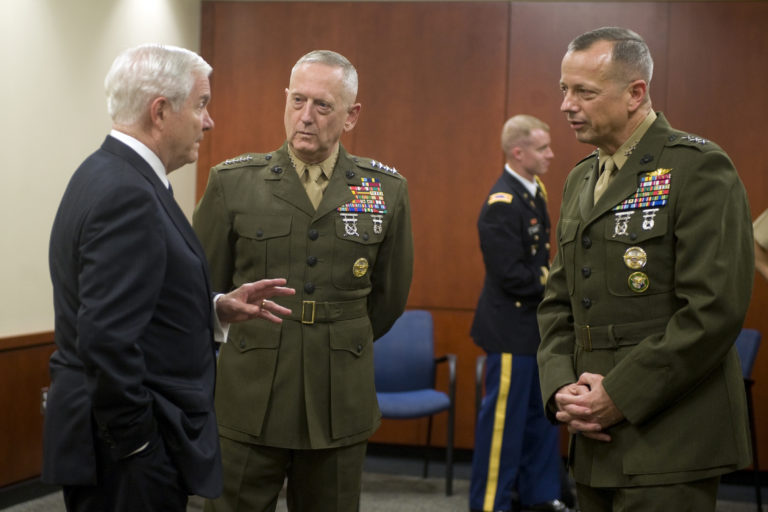Confirmation Hearing Questions Beyond Headlines
Transition45 Series

The Senate Armed Services Committee is preparing to hold a hearing on the nomination of James Mattis to be the next Secretary of Defense. Mattis—a highly regarded retired Marine general—brings to the hearing an element of controversy. His military service makes him ineligible to be Secretary of Defense within seven years of his retirement unless he receives a waiver from Congress. There have been many well-argued pieces on the merits or demerits of nominating a retired military leader to be the Defense Secretary. Mattis’ views on civilian oversight of the military will be important. It will also be important to understand how General Mattis conceives of the range of other vitally important issues facing the country, including the application of U.S. defense power and the role of the Defense Department within the United States government in addressing the many challenges the United States faces.
Issue
The past eight years have seen failed efforts at a “reset” of U.S. relations with Russia, including Russian “cheating” on treaties limiting nuclear forces; significant investment with little return on the U.S.-China relationship even as China has used cyber-espionage to advance the development of its high-end military capability; the rise of ISIS has eroded sovereignty in Iraq and Syria, even as Russia and Iran have backed Syrian President Bashar al-Assad in a campaign that has seen the employment of chemical weapons against his own population. The unabated progress of North Korea’s nuclear weapons program, coupled with advances in its missile delivery systems only serves to underscore the range of potential threats the United States faces.
As the Trump administration prepares to take office, the Senate will have responsibility to ask probing questions of President-Elect Donald Trump’s nominees for national security positions. On Thursday, January 12, the Senate Armed Services Committee will hear from Secretary of Defense nominee, General Mattis.
Below are 10 sets of questions the nominee to be Secretary of Defense should answer for the American public.
Recommended Questions
-
- You have spoken publicly about the United States being in a state of strategic atrophy. What do you believe are the necessary conditions to get the country out of that atrophy? What role do you believe the Secretary of Defense can play in that process, and what do you believe the key elements of a national strategy should be?
- Threats to the United States are growing, or are at least returning to a new normal, following an abnormally low period during the 1990s. What states do you believe pose the greatest threat to the United States?
- We have seen non-state actors such as Al Qaeda and ISIS create significant security concerns for many key U.S. allies, as well as undertaking the attacks of September 11. How would you characterize the threat that terrorist or violent-extremist organizations pose to the United States? How would you prioritize that relative to the threat from state actors?
- Thirty years after the passage of the Goldwater-Nichols legislation, and 15 years into conflicts in Afghanistan and Iraq, there is increasing discussion of reforming the roles and missions of elements of the Pentagon. What do you believe are the essential responsibilities of the Secretary of Defense, and what do you believe is the appropriate institutional relationship between the Secretary and the Chairman of the Joint Chiefs of Staff?
- Every administration wrestles with the inherent frictions in our system of government. The Obama administration has been widely criticized for micromanagement by the National Security Council. What do you believe is the appropriate role for the Department of Defense, the State Department, and the National Security Council staff in national security decisionmaking.

- Former Secretary of Defense Robert Gates spoke about the need to bolster civilian elements of national security, including defense and diplomacy. Undoubtedly during your time commanding forces in Iraq, as CENTCOM commander, and during other assignments, you have seen the contributions of America’s diplomats and development efforts. How do you believe that the Department of State and Department of Defense can better align their efforts to achieve U.S. objectives? Do you believe that U.S. national security interests would be better served by more balanced resourcing across defense, diplomacy, and development?
- In the most recent National Defense Authorization Act, Congress directed the re-organization of defense acquisition offices, including establishing a new undersecretary position, the Under Secretary of Defense for Research and Engineering. Do you support the creation of the new Under Secretary for Research and Engineering, and if so, what do you believe the appropriate balance should be between it and the other newly-created position, Undersecretary for Acquisition and Sustainment?
- In 2015, you testified before this committee that sequestration was the “nearest threat to the national treasure that is the U.S. military.” Do you still believe this to be the case? What specific missions or programs would you prioritize within DoD and in what order? Where would you look to further reduce costs?
- You have discussed the importance of not telegraphing U.S. military actions in ways that allow adversaries respond. Others have argued that such public announcements of U.S. intent provide civilians the notice needed to avoid being in harm’s way. Do you believe this is a tension, and if so, how would you direct the Department of Defense to manage that tension?
- You have written forcefully about the importance of international engagement generally and of alliances in particular to defending the United States and its interests. In what ways should the United States seek to work more closely with allies, and what conditions do you believe should cause the United States pause regarding working more closely with allies and partners?

